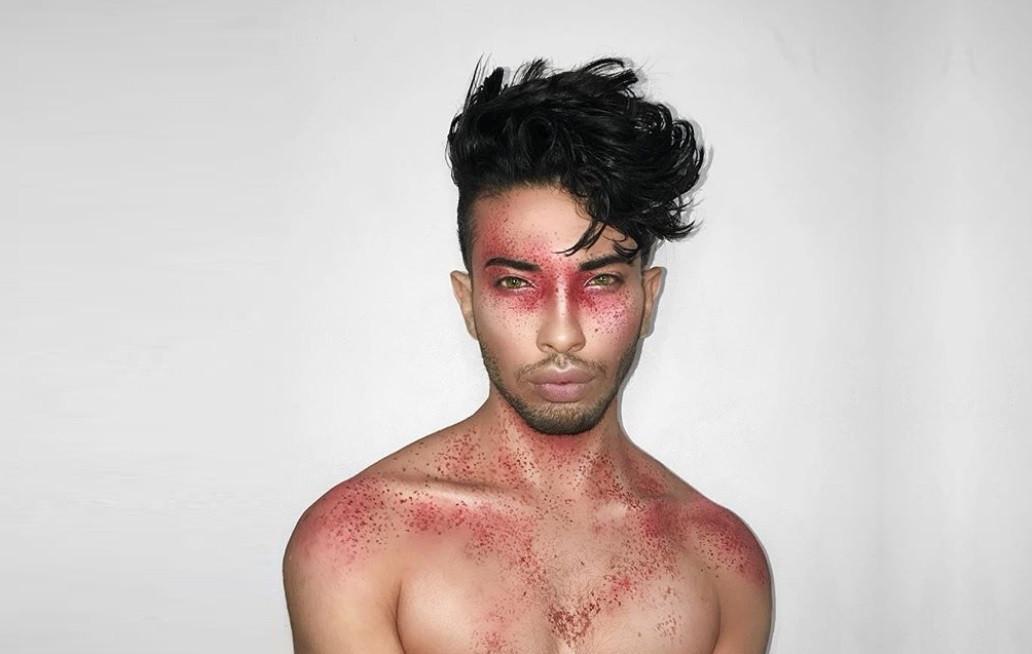Gaza painter uses art to depict rare medical disorders
GAZA-Anadolu Agency

In an effort to fight stigma and raise awareness, Palestinian painter Khalil Z. Khalidy, 24, is using art to introduce rare medical disorders to the public.
Growing up, Khalidy did not have a lot of friends since his parents were constantly traveling. Thus, he started to develop a passion for all kinds of art, especially body painting. Art was his way to voice out his thoughts.
At first, Khalidy started to post informative posts on pigmentary disorders on social media but did not receive the engagement he aimed for. He then returned to visual art to stimulate people to know more.
"Art is controversial and with controversy comes attention," Khalidy told Anadolu Agency.
The young painter believes that recreating these conditions artistically not just bring hope to those who are diagnosed with, but also helps the public to accept them.
"As a body painter, I was fascinated by the patterns these disorders show. It reminds me of fiction characters and superheroes," he said.
Backlash
Spending months of research and study before posting any project, Khalidy gathers all scientific facts and suffering stories endured by patients to presisly illustrate each case.
"I wanted to correct all mistreatment and misinformation about these medical conditions," he said.
"It's an invitation to celebrate diversity and inclusion that's built on understanding and mutual respect."
Body painting is a relatively new thing in the Middle East region, let Palestine alone.
Khalidy's journey was not easy. "Once I posted the vitiligo picture, hell broke down," he recalled the online reaction after posting one of his very first projects.
Ironically, some people accused him of using others' misfortune to gain publicity.
Khalidy explained that he was ready for the online backlash, especially on the local level.
Giving the culture and customs of the society, Khalidy's art was odd and strange at the beginning and took some time for his family and people to accept what he does.
"It's social media, of course. I will face my share of negativity and bullying as well as a sprinkle of brutal judgment to top it all but I'm lucky to have surrounded myself with a group of people who understand what I do and accept it," he said.
Healing power
One of Khalidy's biggest motivations is the positive feedback he receives from people with disorders and how they are happy that somehow there are still people see beauty in them.
Khalidy meets a lot of people with medical conditions in person and they reflect on his art and express their gratitude for him standing up for them.
He also helped applying SFX makeup for educational purposes in lectures and events when he was medicine student at the medical school at the Islamic University in Gaza.
He is now pursuing medicine as a training doctor but never let his artistic dreams die.
Khalidy believes in the healing power of art and resort to it as a stress reliever.
"I feel happy while painting yet concerned of how people would perceive my work," Khalidy said.
Untraditional beauty
When it comes to art, Khalidy says he strips himself of any stereotyping and prefers to stay ambiguous.
"People apply their background and religion on what they see. I want to be recognized by my art. I don't want to be defined by my race, religion or geographical location," he said.
The ambitious young man had to give up many opportunities because of the restricted movement due to the crippling siege Israel imposed on the Gaza Strip for more than 12 years.
He managed to collaborate with some international agencies online, however.
Khalidy's ultimate goal is to be one of the leading reconstructive surgeons in the region and to establish a beauty center specializes in children with birth defects and skin disorders.
"It's more of a rehabilitation center starting from medical care initially, to psychological and life style coaching," explained Khalidy.
"They are unique. I want them to accept and embrace their untraditional beauty."
















